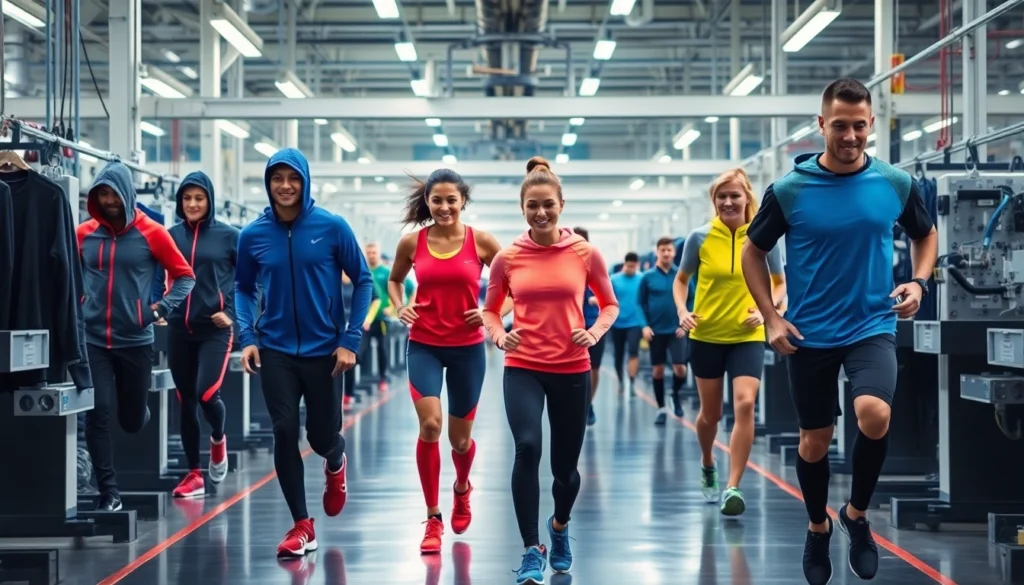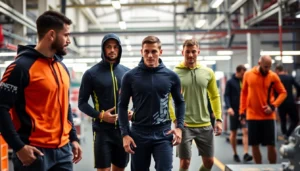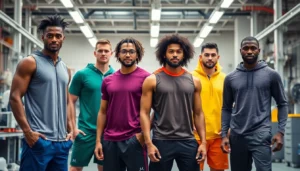Leading Sportswear Manufacturers in Pakistan Delivering Custom Athletic Apparel for Global Markets

Understanding the Role of Sportswear Manufacturers in the Industry
In the highly competitive world of athletic apparel, sportswear manufacturers serve as the backbone of the industry. They transform innovative designs and fabric technologies into functional, durable, and stylish products that meet the evolving demands of athletes and consumers worldwide. As global sports participation increases and athletic culture becomes more mainstream, the importance of partnering with reliable and innovative sportswear manufacturers cannot be overstated. Whether you’re a startup brand or an established retailer, understanding what defines top-tier sportswear manufacturing is essential to ensuring product quality, operational efficiency, and market success.
For businesses seeking high-quality manufacturing solutions, exploring renowned Sportswear Manufacturers in regions like Pakistan offers a wealth of opportunities due to the country’s thriving textile industry and a large pool of skilled manufacturers.
How to Choose the Right Sportswear Manufacturer for Your Brand
Critical Factors: Quality, Price, and Customization
Selecting an appropriate sportswear manufacturer is a strategic decision that influences your brand’s reputation, product performance, and profitability. The primary considerations include product quality, cost-efficiency, and the ability to customize products to your specifications. High-quality manufacturing involves rigorous material selection, precise stitching, and adherence to safety standards, ensuring that your apparel withstands rigorous athletic activities. Balancing quality with competitive pricing is vital to maintain margins while offering value to your customers.
Customization capabilities, such as personalized logos, design variations, and fabric choices, distinguish premium manufacturers from generic ones. Especially in a saturated market, tailored products help your brand stand out. Therefore, assessing whether a manufacturer offers comprehensive customization services is crucial during the selection process.
Evaluating Manufacturing Capabilities and Certifications
Beyond upfront costs and design flexibility, an in-depth evaluation of a manufacturer’s capabilities is necessary. Advanced machinery, skilled labor, and quality control protocols are indicators of a reliable partner. Certifications such as ISO 9001 (quality management) or OEKO-TEX (safe textiles) serve as proof of adherence to international standards, which can mitigate compliance risks and enhance your brand’s credibility.
It’s advisable to request samples before committing to large orders, ensuring the manufacturer’s output aligns with your specifications. Additionally, understanding their lead times, minimum order quantities, and capacity for bulk production helps in planning your launches and inventory management.
Building Strong Partnerships for Long-term Success
Developing a successful collaboration with your sportswear manufacturer involves transparent communication, clear contractual agreements, and mutual trust. Long-term partnerships enable better pricing, priority in production schedules, and ongoing innovation. Regular audits and performance reviews help maintain quality standards, while joint product development initiatives foster innovation and diversification.
Best Practices for Working with Sportswear Manufacturers in Pakistan
Design, Material Selection, and Innovation
Pakistan’s sportswear manufacturing sector is renowned for its skilled craftsmanship and cost-effective production. Leveraging local expertise involves outlining detailed design specifications and selecting fabrics that meet your performance and sustainability goals. Innovative fabric technologies, such as moisture-wicking, anti-microbial, and stretch materials, can significantly enhance product appeal. Collaborating closely with manufacturers to incorporate the latest innovations ensures your products stay competitive.
Product Quality Control and Compliance Standards
To guarantee consistent product quality, establishing a rigorous quality control process is essential. Regular on-site inspections, third-party audits, and comprehensive testing procedures, including durability, color fastness, and safety compliance, should be standard practice. Pakistani manufacturers often conform to international standards; however, verifying certifications relevant to target markets (such as CE, SGS, or ASTM) minimizes compliance risks and opens doors to global markets.
Timely Delivery and Cost Management Strategies
Efficient logistics management is vital for meeting market deadlines and maintaining customer satisfaction. Establish clear lead times and enforce penalties for delays. Cost management entails negotiating payment terms, optimizing order quantities, and planning production around demand forecasts. Many Pakistani manufacturers offer flexible production schedules—building strong communication channels ensures timely delivery without compromising quality or increasing costs.
Case Studies of Successful Sportswear Brands Partnering with Pakistani Manufacturers
Examples of Collaboration and Customization
Several internationally recognized brands have successfully collaborated with Pakistani sportswear manufacturers. For instance, a European football apparel company partnered with a Sialkot-based manufacturer to develop a line of customized jerseys and shorts with advanced moisture-wicking fabrics. The collaboration resulted in high-quality products delivered ahead of schedule, boosting the brand’s seasonal sales.
Impact on Brand Growth and Market Reach
By leveraging local manufacturing expertise, these brands expanded their product lines, reduced production costs, and enhanced competitiveness in price-sensitive markets. This often leads to increased market penetration, improved brand perception, and enhanced consumer loyalty.
Lessons Learned for Future Collaborations
Successful partnerships emphasize clear communication, extensive supplier vetting, and continuous innovation. Maintaining open dialogue about expectations, quality benchmarks, and delivery schedules helps prevent misunderstandings. Additionally, ongoing quality audits and capacity building foster a productive and mutually beneficial relationship.
Emerging Technologies and Future Directions in Sportswear Manufacturing
Innovations in Fabric Technology and Sustainability
Advancements in fabric technology are transforming the sportswear industry. Sustainable fibers, recycled materials, and biodegradable textiles are gaining popularity, driven by consumer demand for eco-conscious products. Incorporating these innovations not only enhances brand reputation but also aligns with global sustainability standards.
Automation and Smart Manufacturing Processes
The integration of automation, robotics, and smart manufacturing tools increases efficiency, consistency, and scalability. Automated cutting, sewing, and quality inspection reduce production times and minimize human error. Smart factories with IoT connectivity enable real-time monitoring, predictive maintenance, and data-driven process optimization, positioning Pakistani manufacturers at the forefront of modern apparel production.
Adapting to Ever-changing Athlete Demands
The sportswear industry faces rapid shifts driven by technological innovation and athlete preferences. Manufacturers investing in R&D and flexible production lines can quickly adapt to new trends, such as compression wear, smart textiles, or performance-enhancing designs. Collaborations with sports scientists, designers, and athletes are increasingly important in developing next-generation products.







